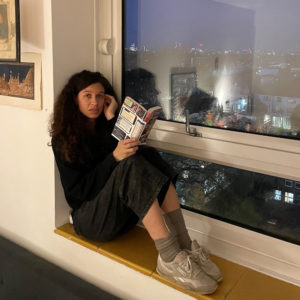
Iphgenia Baal was shortlisted for her collection Man Hating Psycho. She is the author of several fiction books, including The Hardy Tree (Trolley Books, 2011) and Death & Facebook (We Heard You Like Books, 2017). Her unique prose style has been likened to writers as varied as James Joyce, Manuel Puig and Dodie Bellamy, and appeared in publications including AQNB, Nervemeter, Schizm and The White Review.
For you, what is the most difficult aspect of writing?
I don’t find writing difficult; I find it intensely pleasurable. For me, the difficulties lie entirely in publishing. This begins with what to publish — I am a writer who is happy to reveal certain aspects of their private life in their writing but that inevitably means that smug idiots who don’t know the difference between writing and publishing vs. drunken chat then think they know everything there is to know about you and weaponise it against you. The next difficulty is how to publish. A lot of writers who present themselves as left-wing or apolitical are happy to publish with Rupert Murdoch (HarperCollins) or Penguin Random House, who operate in much the same way as the mafia run Italy — using muscle (cash) to destroy any competition. Personally, my politics make this kind of publishing problematic and so I stick with the indies, but even here you are in treacherous territory, with book marketing, sales and reviews; a hideous exercise in nepotism which, if you speak up in protest of, will see you annexed from bookshop shelves or trendy magazines faster than you can regret a misplaced semi-colon. That the richest and most recognised writer in the UK at the moment is JK Rowling should tell you all you need to know.
There is an assumption that the first story in a collection should be the strongest or the most accessible/entertaining, that it should act as a hook. What are your thoughts on this?
I guess this is true to some extent, or at least a first story should let readers know what they are in for but in the case of Man Hating Psycho that doesn’t really apply. The first story in MHP, ‘Change :)’ is more a hangover from the book before, Death & Facebook, which was written entirely in online-speak.
Personally, I approach short story collections as a whole — a collection of texts that interact with one another in much the same way chapters of a novel do… only in a short story collection you can be freer with (il)logical narrative progression.
Out of all the characters in your collection, which one would you like to spend more time with and why?
I tend to write about people I find appalling, so the short answer is none, haha. The (slightly) longer answer is that in this book I have also written about my family (leaving out plenty of bits they objected to), people I love but who make it increasingly difficult to be around them, so I suppose I wish that they were nicer ‘cos then I would hang out with them more.
If you had to write a manifesto for writing short stories, what would be your first declaration?
I’m not big on manifestos as any declaration I make tends to instantly demand an opposite or a correction… but I do like Stewart Home’s incessant mantra, which is that his favourite writers are writers who don’t write. But you’ve got to write a lot before that starts making any sense 😉
In terms of description, how do you decide what to put in and what to leave out?
Include the bare minimum needed to make the point, which is sometimes quite a lot.
After finishing a story, how do you feel? Do you celebrate?
I am the sort of writer that re-writes until a text is forcibly taken out of my hands by an editor or a publisher, so a story is rarely finished for me and rather one draft or the next is finished. A lot of my texts exist in multiple published versions — one version in a book might have appeared in a zine or a journal, and I often have revised editions for reading allowed too. That said, I do take great pleasure, when working on a text, when a set of ideas move into some kind of dynamic play that works. I have been known to get very shouty and excited, which I guess is a celebration, when things (often unexpectedly) fall into place.
